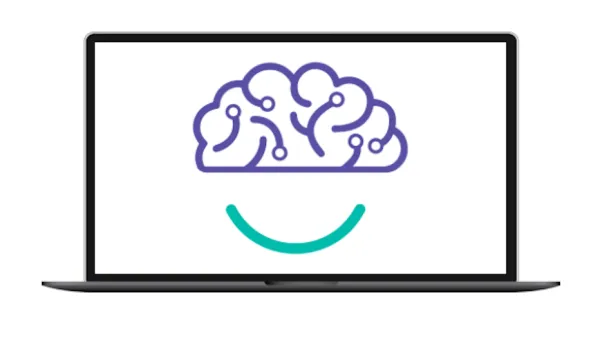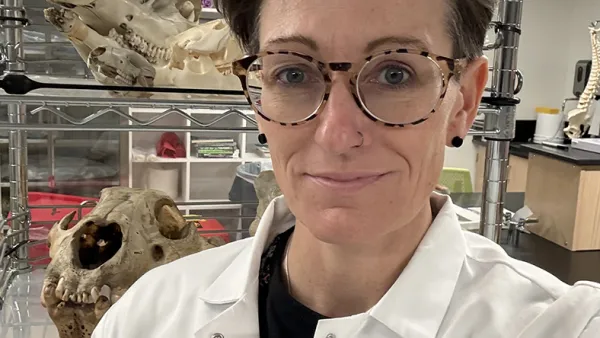Meghan Wright, AB’11 (Biology with a focus in neuroscience), owner of Next Level Neurons, an online school that teaches practical neuroscience-based tools to people living with debilitating chronic illness, wants everyone to know the brain can change.

It is called neuroplasticity, a daunting word upon first impression, but when broken down into its parts, “neuro” and “plasticity”, its meaning reveals itself. The brain changes by rewiring existing connections when learning and experiencing.
Now, Next Level Neurons is teaching people to take control of the brain-rewiring process. “We use the science of neuroplasticity to help people change how their brain works, which can change how the body functions and heals,” said Wright, who is determined to get people suffering from chronic illness out of their homes and back into the world.
Chronic illness affects 6 in 10 adults in the US with varying degrees of severity. For ten years, Wright was one of those individuals. A chemical poisoning incident left her severely allergic to her environment. She lived in isolation until neuroplasticity helped her rewire her brain to tolerate environmental triggers that would previously leave her horizontal, weak, and unable to communicate.
“I went from living on the floor of ten square feet of space because I was allergic to my own furniture to traveling, eating in restaurants, and starting my own business. I want people to know they can have a life, no matter how long they have been sick or how severely sick they are, things can get better,” said Wright.
Trapped in an emergency
Wright was an ambitious WashU undergraduate student. She was focused on her pre-med studies and her dream of becoming a pediatric neurologist. A joy seeker, she engaged in campus life, including flash mob, WU Pops Orchestra, and pre-med honor society. She was living the college experience, pursuing her dreams, and making life-long friends along the way.

A chemical poisoning incident halfway through her college experience almost killed her. She survived the poisoning but developed multiple chemical sensitivities.
Chemical trauma (poisoning), physical trauma (head injury), emotional trauma (severe abuse), and even viral infections (COVID) can trigger the brain to enter an emergency mode. This protective reaction occurs in response to emergencies where safety is at stake. Healing mechanisms, like digestion, sleep, detox pathways, and cell regeneration, shut down, Wright explained, to prioritize a stress response that prepares the body to "fight or flight".
Emergency mode is meant to be temporary. Once the emergency has passed, the body should recalibrate back to healing mode. But people with chronic health conditions are trapped in emergency mode.
Wright was trapped. Her body could not heal, and conventional medicine left her with no answers. She was dangerously allergic to almost everything around her. She could not hug family members. A Ziplock bag served as a protective barrier to the oleophobic coating on her tablet that gave her blisters. She had to eat specially sourced foods made in a surgically decontaminated kitchen. Trace levels of chemicals would cause anaphylactic shock.
She took a year off to focus on her health, returning with her mother, who cared for her basic needs while she focused on finishing school. But college looked different for Wright, who missed many days of class when allergic reactions left her ill for days at a time.
Despite having to give up her lifelong dream of becoming a doctor, she maintained an admirable level of optimism about her condition. “I had complete confidence that I was going to get better. I was going to get back to my life. This was not my forever,” said Wright.
Unleashing an army poised to change the world
“We don’t know why some people get stuck in emergency mode. But we know that the physical landscape of the brain changes during that time,” explained Wright, who is encouraged by the conversation that long COVID has brought to acknowledging the brain dysfunction that can occur after experiencing trauma and illness.
“Neurons that fire together, wire together,” continued Wright. The part of the brain that handles emergencies is unconscious. But it also responds to conscious feedback. Avoiding an allergen or using Benadryl at the sight of an allergen sends a powerful message to the brain that the allergen will cause harm. Changing that message can change the brain.
“This involves consciously changing our responses, thoughts, and behaviors towards triggers that increase our symptoms. It can also involve controlled, incremental exposure to triggers while implementing the response-changing tools,” explained Wright, who herself is a living example of how brain rewiring can get the body unstuck and away from “emergency mode” and into “healing mode”.
To rewire her airborne allergy to citric acid, a compound found to varying degrees in all plant foods, Wright started with a cucumber occupying her space as far away from her as possible. The cucumber would move closer with each exercise. One day Wright touched the cucumber. Eventually, she cut it in half. Then she touched it to her lips. She worked her way through foods with higher and higher concentrations, culminating in lemons after 2.5 years. Today, she can drink all the lemonade she craves.
After ten years, brain rewiring de-escalated Wright’s allergies, allowing her body to heal and finally accept the treatments she was previously dangerously sensitive to. She is launching Next Level Neurons this fall to help others learn how to apply neuroplasticity to their healing journey.
Brain rewiring is not a novel concept. However, applying neuroplasticity to healing is not currently easily accessible to everyone. Next Level Neurons plans to change that.
“Accessibility is at the heart to what we do. I want every person to know they have the power to improve their quality of life and get back out into the world!” said Wright.
“Accessibility is at the heart to what we do. I want every person to know they have the power to improve their quality of life and get back out into the world!” said Wright.
“People who have dealt with the severity of illness want to be changemakers. They appreciate what a gift it is to be alive. Different areas of the world are going to be better and brighter because there's this army of people who are waiting to improve it,” said Wright.
With the fall launch of Next Level Neurons, Wright will be leading that army into the world.
You can follow Wright on Instagram.com/nextlevelneurons




